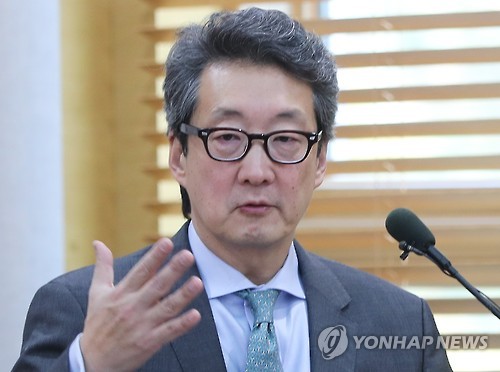North Korea is exercising restraint from nuclear and missile tests to avoid galvanizing conservatives in South Korea ahead of a presidential election, and is certain to resume provocations once the leadership crisis in the South is resolved, a top U.S. expert on Korea said Tuesday.
The assessment from Victor Cha, a Georgetown University professor and Korea chair at the Center for Strategic and International Studies, breaks with more common perceptions that Pyongyang is holding off on action until the new administration of U.S. President Donald Trump puts together its North Korea policy.
"Pyongyang carried out two (failed) medium-range ballistic missiles tests prior to President Trump's election on October 15 and 20, 2016. The only reason they have not followed the election with an action, we believe, is because of the domestic political crisis in South Korea," Cha said during a House Foreign Affairs Committee hearing, referring to the North's failed Musudan missile launches.
"That is, President Park Geun-hye's political downfall and the potential for a progressive, pro-DPRK government coming to power in the South has complicated Pyongyang's calculations as they do not want to take actions that might create ballast for the conservatives," he said. "However, once this crisis of leadership in the South is resolved (or even before then), ballistic missile and nuclear tests are sure to follow."
Just as the Sept. 11 attacks defined the term of former President George W. Bush, North Korea is expected to be Trump's Sept. 11, Cha said, adding that he expects the North to carry out an intercontinental ballistic missile (ICBM) test or nuclear test early in the Trump administration.
North Korea has not undertaken any provocative acts since the November election, though leader Kim Jong-un said in his New Year's Day address that the country is close to test-firing an ICBM, an apparent threat that it's perfecting capabilities to strike the continental U.S.
The North then placed two ICBMs on mobile launchers for apparent test-firing, but later put those missiles back into hiding. Many experts saw that as a sign that the regime might have opted to wait out until the administration of President Donald Trump puts together its North Korea policy.
In order to cope with the North's threats, Cha said, the U.S. and the South should expedite the planned deployment of the THAAD missile defense system in the South while considering a regular rotation of new strategic assets and capabilities to the peninsula that enhance extended deterrence.
He also said the U.S. should further tighten the screws on Pyongyang, including sanctioning the North's labor exports, which has increasingly become a key source of foreign money for the regime, and considering imposing secondary sanctions.
The Trump administration should also make an early and high-level statement about the North's human rights record and its support of the recommendations of the U.N. Commission of Inquiry on human rights in the country, the expert said.
At the start of the hearing, Rep. Ed Royce (R-CA), chairman of the committee, also called for greater pressure on the North, saying the North is close to targeting "all 50 states and our Asian allies with a nuclear warhead."

"With hundreds of thousands of North Korean laborers abroad -- sending as much as $2 billion a year back to the regime in hard currency -- we should look at targeting this expatriate labor," Royce said.
"Loopholes in our sanctions on North Korea's shipping and financial sectors must be closed. And when we discover that foreign banks have helped Kim Jong-un skirt sanctions -- as those in China have repeatedly done -- we must give those banks and businesses a stark choice: do business with Kim Jong-un or the U.S." he said.
During the hearing, one lawmaker, Rep. Tom Marino (R-PA), asked about regime change in the North, an indication that shows how seriously Congress takes threats from the North.
"What is the reality of overthrowing the regime in North Korea? How do we do it, can it be done, and who takes over?" Marino asked.
In response, former U.S. negotiator Robert Gallucci said, "I think if there were an easy way to go, a safe way to go, a way that would not produce a war in the Korean peninsula, we probably would have been exploring that for decades."
"I don't think there's an easy outcome in that direction. I think what we are trying to do is limit this threat, not exacerbate it," he said. (Yonhap)

